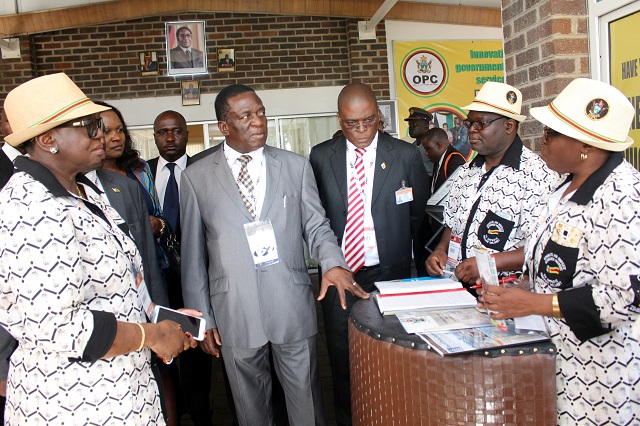Industrialisation critical: Mnangagwa


Vice President Mnangagwa (second from left) was yesterday taken through the Office of the President and Cabinet stand by ambassador Mary Mubi (left) while ZITF chairman Bekithemba Nkomo and OPC officials look on
Prosper Ndlovu, Business Editor
VICE President Emmerson Mnangagwa says embracing a technologically-driven business model is critical if Zimbabwe is to achieve meaningful economic progress and make an impact in the global economy.
Officially opening the International Business Conference at the Zimbabwe International Trade Fair (ZITF) in Bulawayo yesterday, VP Mnangagwa said the government was putting in place investment reforms aimed at modernising the economy in the context of regional and global integration.
He said the theme for this year’s ZITF: “Innovate-Integrate – Industrialise” was befitting and challenged local and international exhibitors to seek strategic synergies that would assist in economic revival.
“Innovation has a huge impact on economic growth and job creation and its adoption can transform Zimbabwe from a sleep backwater to a leading centre of global innovation and a thriving technologically sophisticated country,” said the Vice President.
“I call upon industry and commerce to rapidly adopt and adapt to cutting-edge innovation solutions in order to withstand competition.
“Revision of business models towards competitive production of higher quality value-added products and services with an export orientation is paramount to sustainable economic growth and development of Zimbabwe.”
He said Zimbabwe could realise its comparative advantage through practical and cost effective interventions in national development.
Mnangagwa said innovative industrialisation was at the heart of the SADC industrialisation roadmap and the broader African Union vision that is anchored on leveraging natural resources for improved economies.
The drive has been successfully pushed by President Robert Mugabe during his tenure as chairman of the two regional bodies.
“Industrialisation without integration is susceptible to stagnation. Changing world economic realities underscore the importance of closer economic cooperation for sustained and stable growth.
“In this respect, regional cooperation and integration are therefore preconditions for accelerated economic and social development,” said the VP.
He said the government, through the Office of the President and Cabinet, was spearheading the ease of doing business reforms aimed at attracting increased investment by removing unnecessary legislative bottlenecks as well as improving efficiency and timelines in the approval and issuing of licences and permits among others.
Some of the policy interventions under spotlight include the diaspora policy, special economic zones and the investor perception survey.
He said the government would play its role in creating favourable business conditions and directing the economic dispensation towards innovation and industrialisation, which lead to growth and development.
Mnangagwa called for more investment into research and efficient working processes through input from tertiary learning institutions and industry in various forms.
“We must continuously evolve linkages, synergies and symbiotic relationships to strengthen the creation, diffusion and application of knowledge and research outcomes for the benefit of our national economic competitiveness,” he said.
The VP said the government would continue to engage the international community including multi-lateral institutions in developing more comprehensive economic reforms.
He said this was critical in the context of economic integration, which is the cornerstone of creating large markets and increasing trade flows.
“There’s therefore a need for a paradigm shift by industry and business towards the use of abundant domestic resources and skills to provide goods and services of competitive quality.
“This will in turn undoubtedly endear Zimbabweans to locally produced goods and make them competitive on the international market,” said Mnangagwa.
To this end, he added, the government remains committed to assisting industry and business in their efforts to retool in order to ensure business viability.












Comments